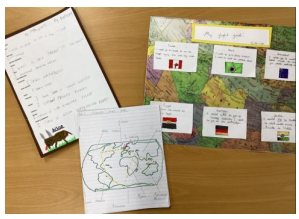Geography
Intent
At Lovington Primary School, we believe Geography is fundamental in enabling children to develop a coherent understanding of the world around them. Being taught location and place knowledge, about the human and physical features of the world, alongside geographical skills and fieldwork, will prepare them to live and thrive in the ever-changing world we live in.
During their studies, the children will develop knowledge and understanding of their local area and beyond which will include the United Kingdom, Europe and The Americas. As they journey through our school, indoor and outdoor learning will enable them to extend their geographical vocabulary and skills. They will have opportunities to collect, analyse and present data as well as use maps, atlases, globes and digital mapping. With the current and ongoing issues our world is facing, we also educate our children so that they become compassionate citizens that care about our earth.
We encourage our children to be ambitious, to be citizens who want to achieve, with a sense of awe and wonder about their world, to enhance their sense of responsibility which involves using a range of investigative and problem solving skills.
We endeavour to provide a Geography curriculum which ignites every child’s passion for learning as they journey through Lovington Primary School.

After learning all about Amelia Earhart, Pippin Class children created their own flight guides, stating where they would travel to and why.
December 2024
Implementation
The curriculum is sequenced to enable pupils to build cumulative knowledge towards agreed milestones. Four main concepts have been mapped out across the year groups to ensure that children build upon their prior knowledge. These four concepts are:
- Locational
- Human
- Physical
- Legacy
These key concepts underpin learning in each milestone. This enables pupils to reinforce and build upon prior learning, make connections and develop subject specific language. Geography is taught every term throughout the year, and can be interwoven with a History topic, taught as a stand-alone subject or form the main learning enquiry. At the beginning of each learning experience, children are given the opportunity to convey what they know already, as well as what they would like to find out. This informs lesson planning which is used alongside the progression of knowledge and skills document and long-term planning.
Exciting opportunities are provided in Geography, such as visits to habitats in the local environment and trips to sites which enrich the learning process and allow access to areas of expertise. Teachers create a positive attitude to Geography learning within their classrooms and reinforce an expectation that all children are capable of achieving high standards.
As a school, we apply or utilise a variety of teaching methods to cater for all of our learners. Children may use books and ICT to support their learning. They work individually and as part of a team to present their findings orally as well as in writing and through Art, DT, ICT and role-play.
Impact
By the end of KS2 our children will know more, understand more and remember more about Geography and the world. They will be motivated and inspired to continue their learning as they progress to KS3.
Children will develop a range of life skills, which they can use and develop beyond school life. Our pupils will display confidence and enjoyment in Geography. They will use and apply skills across the curriculum, making meaningful connections in purposeful contexts. Our engagement with the local environment ensures that children learn through varied, practical and first-hand experiences of the world around them. Through various fieldwork activities, enquiry questions and themed units of work, children will have the understanding that geography impacts upon our lives daily.
We measure the impact of our Geography curriculum through monitoring work, listening to the children’s attitudes about Geography through pupil voice and by taking learning walks and looking at books.
Assessment
Curriculum quizzes are used to review learning and check that children know more and remember more. Learning is reviewed on a termly basis, at a distance from the point of (initial) learning so that teachers can check whether information has been retained and adapt planning. Formative Geography assessment is ongoing throughout the relevant cross-curricular themes to inform teachers when planning lesson activities and differentiation.
